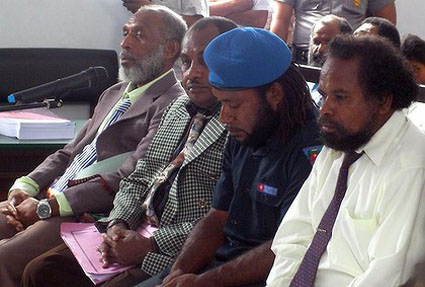
JAYAPURA (Human Rights Watch / AFP / Pacific Media Watch): The Indonesian government should drop the politically motivated treason charges against five Papuan activists who have been convicted over a peaceful protest and order their release, says a global human rights group.
Human Rights Watch branded the court judgment as “unjust convictions, while those responsible for the violence go unpunished”.
The District Court in Jayapura, the provincial capital of the West Papuan region, convicted the five men and sentenced them to three years in prison for statements made at a peaceful Papuan People’s Congress in October 2011. The demonstration was brutally suppressed by the authorities, leaving at least three people dead.
The five men convicted yesterday are Selpius Bobii, a social media activist; August Sananay Kraar, a civil servant; Dominikus Sorabut; a filmmaker, Edison Waromi, a former political prisoner, and Forkorus Yaboisembut, a Papuan tribal leader who has been described by supporters as president of a self-proclaimed independent West Papuan state.
“If the Indonesian government wants to make an example out of these people, then it should free them as a symbol of its commitment to free expression,” said Elaine Pearson, deputy Asia director at the New York-based Human Rights Watch.
“Instead, the legacy of the Papuan Congress crackdown will be five unjust convictions, while those responsible for the violence go unpunished.”
West Papuans, mostly indigenous Melanesians, have long accused Indonesia’s military of violating human rights in the region and complain that the bulk of earnings from its rich natural resources flow to Jakarta, reports Agence France-Presse.
“All five defendants are found guilty of committing treason as stated in the criminal code. All aspects have been proven legally and convincingly,” Judge Jack L. Oktovianus told the Jayapura District Court.
Three years in jail
“We sentence them all to three years in prison.”
The maximum sentence for treason is life in prison, but prosecutors had sought a five-year prison term.
The HRW statement said:
On October 19, 2011, in Jayapura, Indonesian security forces used excessive force to break up a three-day People’s Congress demonstration supporting independence for Papua, Human Rights Watch said.
After Yaboisembut, one of the leaders, read aloud the 1961 Papua Declaration of Independence, police and the army fired warning shots to disperse the approximately 1000 Papuans gathered.
The security forces then used batons and in some instances firearms against the demonstrators, killing at least three and injuring more than 90 others. Witnesses said that demonstrators had been struck on the head and several suffered gunshot wounds.
Following the incident, 17 police officers, including the Jayapura police chief, Imam Setiawan and seven of his subordinates, were given written warnings for committing a disciplinary infraction by not giving priority to the protection of civilians. However, no other action was taken against police or military personnel for possible misuse of force.
Due process concerns
The trial of the five activists raised serious due process concerns, Human Rights Watch said. During the trial, the defence told the court that police questioned their clients in the first 24 hours of arrest without the presence of lawyers.The defence also alleged that the men were beaten by police while in custody. Police allegedly kicked Yaboisembut in the chest and beat his head with a rifle butt. Sorabut testified that the police beat him on his head with a pistol and struck his body repeatedly with an M-16 assault rifle. Kraar said he was hit by police twice on the head with a pistol.
Human Rights Watch renewed its call for the Indonesian government to release all political prisoners and allow human rights organisations and foreign journalists unimpeded access to West Papua.
The Indonesian Criminal Code should be amended to ensure that no one is prosecuted for treason for exercising their rights to peaceful protest protected under the Indonesian constitution and international law, Human Rights Watch said.
The constitution, in article 28(e), states: “Every person shall have the right to the freedom of association and expression of opinion.”
Article 28(f) provides: “Every person shall have the right to communicate and obtain information for the development of his/her personal life and his/her social environment, and shall have the right to seek, acquire, possess, keep, process, and convey information by using all available channels.”
The International Covenant on Civil and Political Rights, which Indonesia ratified in 2006, similarly protects the rights to free expression and peaceful assembly.
Self-determination
Human Rights Watch takes no position on claims to self-determination in Papua.
Consistent with international law, however, Human Rights Watch supports the right of everyone, including independence supporters, to express their political views peacefully without fear of arrest or other forms of reprisal.
“Throwing activists in prison on charges of treason will just reinforce Papuans’ beliefs that the Indonesian government uses the law for political purposes,” Pearson said.
“And while the government is busy prosecuting peaceful protesters, it seems to have had no time to investigate adequately the violence against them.”

This work is licensed under a Creative Commons Attribution-NonCommercial 3.0 New Zealand Licence.



